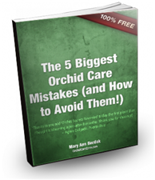
Buying from orchid growers can go one of two ways: you might end up with a robust, healthy plant with tons of beautiful blooms, or you might simply end up with a dud that wilts as soon as you get it home.
The good news is that you are in total control of how your trip to the orchid grower turns out! You just have to know the right questions to ask.
You see, there are good orchid growers and bad orchid growers, but if you know what to look for and what to ask, you can always be sure that the plant you’re buying is of top quality. So here are 3 key questions to always keep in mind…
Question #1: What exact type of orchid are you buying?
It can be difficult to know where to begin in orchid growing, because there are just so many different varieties available. (In fact, there are more than 35,000 orchid genera out there!)
That’s exactly why you need to be sure to clarify with your orchid grower what type of plant it is that you’re buying. Each one of those 35,000 types requires drastically different care in order to get the best results. Some orchids need more light than others, while some orchids require less watering.
If you jump in without knowing what type of orchid you’re buying, how will you know how to properly care for it? This is especially important because you may be limited in the type of care that you can provide to an orchid.
For example, if you don’t have a lot of full sunlight available in your home, and you don’t have the means to build a greenhouse, you wouldn’t be able to give the right care to an orchid that requires a lot of direct sun exposure. Likewise, if you do live in an area with a lot of intense sunshine and heat, you probably don’t want to try to grow an orchid that prefers a cool and brisk climate.
If you’re just starting out, the best advice for a beginner is to try to find a Phalaenopsis (commonly called a “moth orchid”). This is a very sturdy type that is inexpensive and easy to care for, but still produces the same colorful flowers as its more exotic sisters.
Question #2: What is the blooming status?
When you’re looking at buying an orchid, you may find that they’re labeled with signs reading “BS” (no, not that type of “BS”!) or “NBS”. These labels simply refer to the “blooming status” of the orchid, and this is something you should be sure to clear with the orchid grower before you buy.
The “BS” stands for “blooming size”, and means that an orchid, if properly cared for, will produce blooms within the next year. This is a healthy and mature plant that has already been brought through the most delicate stages of development, which makes it a good bet for beginners.
(Tip: A moth orchid in “BS” stage is a surefire bet for any orchid lover!)
“NBS” stands for “near blooming size”, which means that the orchid is a year or two away from blooming. Plants like this are less fully developed than “BS” plants, and so you’ll have to pay a lot more attention to them.
The trade-off is that they tend to be more moldable, and once you have some experience under your belt, you might enjoy experimenting with “NBS” plants to see what you can get them to do under different circumstances and conditions. That’s what keeps so many of us hooked on these fascinating plants!
Question #3 – What kind of pot was used?
Not only do you want to be sure that you can provide optimal conditions for your orchid, you want to be sure that the orchid growers did the same before you came along and bought it. That’s why you have to be sure to ask what kind of pot your plant was reared in.
Considering the wide variety of orchids, it should come as no surprise that different orchids have roots that behave in different ways.
The cymbidium orchid has roots that can grow straight down for more than a meter, so you would need a very tall pot! A cymbidium that was reared in a short pot will be stunted, and you should avoid buying one.
Likewise, something like an anoecetochilus should be grown over a broad and shallow surface, so one that’s been constrained to a narrow pot will likely never be as healthy as you’d like. Still others like draculas and ladies-of-the-night do best in hanging baskets, where their roots can get plenty of air.
The main point is this: when you buy from an orchid grower, it pays to learn as much as you can about what type of orchid and what kind of care it needs in order to live up to its full potential. By asking these three key questions, and doing some investigating on your own, you can avoid the potential pitfalls of buying from orchid growers, and be sure that your plant is one that will thrive and offer you years of satisfaction.
And now, for even more proven orchid growing tips, download my totally FREE 5-Day Orchid Insider training course by going here: Orchid Care Insider Secrets




I am so glad I found your website, my wife and I had just talked about orchids and how about going about getting one this is just the post we needed.
Orchids are such amazing plants, I have for years been tempted to go ahead and raise them however I have always been afraid too because they do require a little more work than other kinds of plants. I think that after reading your site I can work up the confidence to try growing one.
Great post and a really great website. I love orchids and now I think I will get one (from an orchid grower of course :))and grow one of these beauties.
My girlfriend has been asking for an orchid and I am so glad I found your website. I will make sure to get a moth orchid as soon as possible thanks you much for the great advice.
I really loe your site I am some what of a orchid fan myself and am glad that there are websites like yours out there for us. Keep up the good work and the great advice.
I think question #2 is the one I ask the most. Thank you for clearing up the difference between BS and NBS that is just what I wanted to know.
valued information.
I love seeing orchids whenever I visit my mom. I want to grow orchids so I can give her some of my work on her birthday. She will love that.
Arnie – That sounds like a nice idea! I’m sure she will like that. Let us know how it goes. – Mary Ann
I am just a beginner and starting isn’t easy. This article will help me in so many ways. I will save your site so I can visit it anytime I want.
Thanks, Tara! I hope things are going well. Let us know how your orchids are doing! – Mary Ann
This is a very interesting article. My best friend always wanted to try to grow a few orchids. I will help her achieve her dream by sharing your site. This will be her guide.
Thanks for passing our site along to your friend. I hope it is helpful to her. – Mary Ann
My friend is buying orchids from an orchid grower tomorrow and I will accompany her. I will definitely ask these questions. My friend will be surprised since she thought I don’t know anything about orchids. I will love to tell her about your site.
That’s great, Milly. And thanks for helping get the word out about the site. I hope you had a successful orchid buying experience! 🙂 – Mary Ann
thank you for the lovely information in yr newsletter.
You’re very welcome. Thank you so much for your comment! Please let us know how you are doing. – Mary Ann
This is a very informative site for me since I love the moth orchids and the cymbidiums.
I am not a beginner but it is good to rev up and stay in touch.
The newsletter is a welcome addition.
Thank you.
Thank you for your comment! 🙂 We’re glad to have you. – Mary Ann
Amazing! This weekend I am off to view orchids and so your info is going to be put to good use, Thankyou! Love reading and getting all these tips. As I live in western Australia I do have to adjust a few things because of seasons etc.
Great site thanks..cheers, Kath
Sounds great! Good luck! Let us know how it goes. 🙂 – Mary Ann